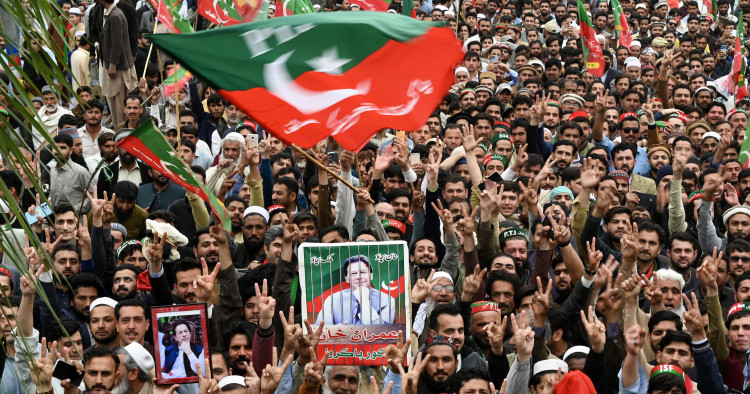The deep rift between the Pakistan Tehreek-e-Insaf (PTI) party and Pakistan’s civil-military establishment shows no sign of weakening but appears to be shifting. The coalition government and its military sponsors, so recently seen as having taken command of the political heights, are now showing signs of panicking as they appear to be losing the initiative and ability to set the narrative. Efforts to crush the PTI have stirred controversy and mostly backfired, resulting in increased popular sympathy for its imprisoned founder, Imran Khan.
The major contributor to unsettling the ruling civil-military establishment has been Pakistan’s judiciary, with its favorable rulings for the former prime minister. Although the courts were once viewed as regularly doing the establishment’s bidding, there is a growing impression that a nexus has developed between Khan and the nation’s top judges. The government has accused the Supreme Court, which has called for Khan’s release, of acting like a wing of his party and has made clear its intention to keep him locked up by initiating new charges. The military has honed in on the infamous May 9 riots — which saw nationwide attacks on army installations — to denounce the judiciary, warning that if the courts allow the perpetrators and facilitators to go unpunished, they will be promoting “fascism” in the country.
This gulf between the establishment and judiciary is only likely to widen further as Supreme Court Justice Mansoor Ali Shah, known for his rulings in favor of the PTI, is slated in October to replace the reputed pro-military Chief Justice Qazi Faiz Isa. In anticipation of a change that could bolster the PTI’s ongoing legal and political offensive against the government, the party has filed a petition with the Supreme Judicial Council, the country’s judicial watchdog authority, against the chief election commissioner and the Election Commission of Pakistan, alleging rigging and misconduct in the Feb. 8 general elections and calling for a judicial inquiry into these allegations. The PTI has additionally asked the Supreme Court to take sou motu notice against the ongoing crackdown on its members.
A more confident Khan appears to have altered his strategy to return to power. Until very recently, he had seen negotiations with the military as the only realistic way to secure his release from prison and reenter the political fray. He has long insisted that he has no gripe with the military as an institution and is willing to work out their differences. But Khan is now focused more on the possibility of ousting the Pakistan Muslim League-Nawaz (PML-N), Shehbaz Sharif-led government through parliamentary means. His party is reportedly counting on gaining as many as 80 additional seats in the National Assembly, currently occupied by the PML-N and the Pakistan People’s Party (PPP), through an already ongoing investigation of the February election. Hearing the PTI’s arguments, an electoral tribunal is expected to reach a decision by the end of the year. Looking ahead, a hopeful Khan has announced that by December, his party will be ready to topple the current regime through a no-confidence motion and form a new government. Khan has announced his intention once in office to call for fresh elections and with a sweeping victory destroy the PML-N and PPP political dynasties.
Determined to stay in power for years yet, the government is hitting back and has not given up on removing Khan and his party from the political scene. While banning the PTI outright was considered, its coalition party partners opposed the idea, fearing it would set a bad precedent. The government is now focusing on revising its legal strategy. It sees its cases against Khan as having been weak, containing major loopholes that allowed him to secure his court release in several cases. The government’s new approach is to label Khan and his party as terrorists. To this end, they have introduced the concept of "digital terrorism," accusing PTI supporters and social media teams of damaging the country's image and undermining state institutions with anti-state propaganda. Special courts have been established under the Prevention of Electronic Crimes Act (PECA) 2016 to prosecute "digital terrorists" and those allegedly involved in spreading "anti-state propaganda" through digital platforms.
Missing in recent months has been the long-threatened PTI popular agitation. After holding back on large-scale demonstrations in the hope that legal means would free Khan from imprisonment, a frustrated PTI may be about to change course. It has just announced country-wide protests on Aug. 5, which marks the calendar date of Khan’s first arrest. If in the face of heavy, escalating violence the civilian authorities are unable to maintain order, it should not be ruled out that the military may use the opportunity to install a nonparty government of technocrats, much like what occurred this past fall. But it would not be for the purpose of preparing new elections. Having made it abundantly clear that it cannot coexist with a Khan-led government, the army command may feel that its only choice is another run of hybrid, autocratic rule for Pakistan.
Dr. Marvin G. Weinbaum is the director of the Afghanistan and Pakistan Studies Program at the Middle East Institute.
Naad-e-Ali Sulehria has over five years of involvement working with international organizations and think tanks in different capacities as a political researcher, policy advisor, peace strategist, and human rights practitioner. He currently serves as a Research Assistant to Dr. Marvin G. Weinbaum, director of the Afghanistan and Pakistan Studies Program at the Middle East Institute.
Photo by ABDUL MAJEED/AFP via Getty Images
The Middle East Institute (MEI) is an independent, non-partisan, non-for-profit, educational organization. It does not engage in advocacy and its scholars’ opinions are their own. MEI welcomes financial donations, but retains sole editorial control over its work and its publications reflect only the authors’ views. For a listing of MEI donors, please click here.













